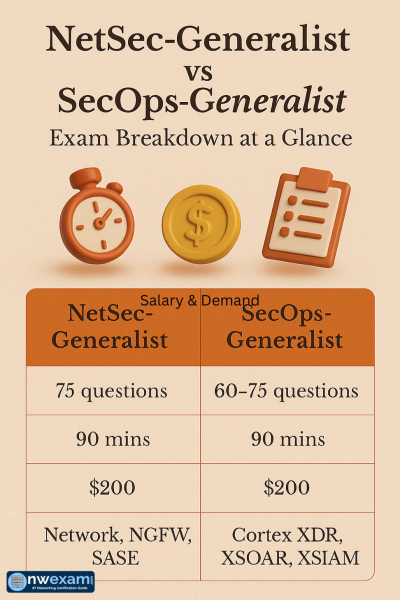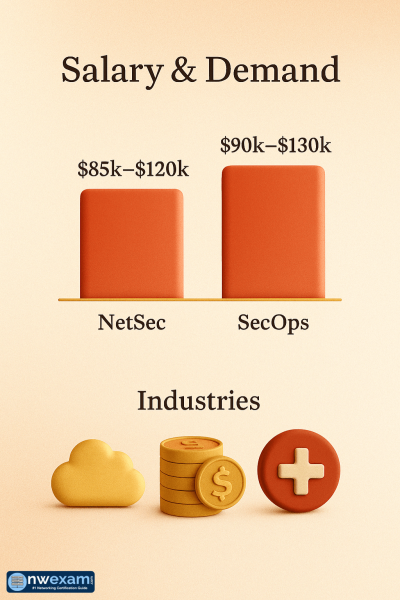
Selecting the right cybersecurity certification can significantly impact your career trajectory. The Palo Alto NetSec-Generalist and SecOps-Generalist certifications each offer distinct pathways, skills, and job opportunities. Here’s your ultimate guide to making an informed career decision.
The Basics of NetSec-Generalist Certification
Certification Overview
-
Name: Network Security Generalist
-
Exam Code: NetSec-Generalist
-
Duration: 90 minutes
-
Questions: 75
-
Passing Score: 860/1000
-
Fee: $200 USD
Exam Syllabus
-
Network Security Fundamentals (16%)
-
NGFW and SASE Solution Functionality (18%)
-
Platform Solutions, Services, and Tools (18%)
-
NGFW and SASE Solution Maintenance and Configuration (19%)
-
Infrastructure Management and CDSS (15%)
-
Connectivity and Security (14%)
Explore detailed syllabus.
Exploring SecOps-Generalist Certification
Certification Overview
-
Name: Security Operations Generalist
-
Exam Code: SecOps-Generalist
-
Duration: 90 minutes
-
Questions: 60-75
-
Passing Score: 860/1000
-
Fee: $200 USD
Exam Syllabus
-
Security Operations Fundamentals (25%)
-
Cortex XDR (23%)
-
Threat Intelligence and Incident Response (16%)
-
Cortex XSOAR (16%)
-
Cortex XSIAM (20%)
Explore detailed syllabus.
Detailed Comparison of Exam Content
Comparing NetSec-Generalist vs SecOps-Generalist Exam Domains
Understanding the core exam content is vital when deciding between the NetSec-Generalist vs SecOps-Generalist certifications. While both exams are 90 minutes in duration and have a passing score of 860 out of 1000, the domains they cover and their specialization areas differ greatly.
NetSec-Generalist is centered around network protection technologies. Its syllabus includes NGFW, SASE, platform solutions, and infrastructure management. It tests your understanding of network traffic, security architecture, and hands-on firewall configuration. Candidates must be prepared to handle scenarios involving policy configurations, SASE architecture, and troubleshooting NGFW performance.
On the other hand, SecOps-Generalist dives deep into operational cybersecurity. The exam emphasizes the use of Palo Alto’s Cortex suite - XDR, XSOAR, and XSIAM - tools for detecting and responding to threats. A strong understanding of incident management workflows, automation playbooks, and threat hunting is necessary.
Exam Difficulty and Breadth
NetSec-Generalist is broader, touching several domains of network security but not going too deep into any single one. This makes it accessible to networking professionals transitioning into security roles. The challenge lies in the breadth of content.
SecOps-Generalist, meanwhile, goes narrower and deeper. Its difficulty lies in the depth of platform-specific operations and the candidate’s ability to apply security operations tools in live scenarios. If you thrive in threat detection and response environments, this is your niche.
Both exams are highly respected and require practical exposure. Choose based on whether you're more inclined to protect infrastructure (NetSec) or respond to threats (SecOps).
Career Advancement Opportunities
Where NetSec-Generalist vs SecOps-Generalist Certifications Can Take You?
Both the NetSec-Generalist and SecOps-Generalist certifications open doors to critical cybersecurity roles, but the directions they point to are distinct.
NetSec-Generalist Career Pathways
-
Network Security Engineer: Designs and implements network protection strategies, maintains firewall infrastructure, and oversees VPN and SASE deployments.
-
Security Analyst (Network Focused): Analyze network behavior to detect anomalies and improve firewall policies.
-
Network Administrator with Security Focus: Take charge of managing secure network configurations, especially for enterprises adopting hybrid cloud.
This certification is ideal if your career goals involve building secure infrastructure or leading firewall strategy.
SecOps-Generalist Career Pathways
-
Security Operations Analyst: Work in a SOC (Security Operations Center) to monitor, detect, and respond to threats in real time.
-
Threat Intelligence Analyst: Use Cortex tools to gather, correlate, and analyze threat data.
-
Incident Response Manager: Coordinate incident detection, escalation, containment, and remediation.
This track is well-suited for professionals eager to be on the frontlines of cyber defense.
Both certifications are stepping stones to advanced credentials like Palo Alto’s PCNSE or vendor-neutral options like CISSP or GCIH. They’re also a great addition to those aiming for leadership roles in security strategy or operations.
Skill Development and Educational Paths
Building Skills with NetSec-Generalist vs SecOps-Generalist Certifications
Developing the right skills post-certification is key to maximizing the benefits of your Palo Alto credential.
NetSec-Generalist Skillset
This path sharpens your ability to manage and secure modern enterprise networks. You’ll learn to:
-
Configure and maintain next-generation firewalls (NGFW)
-
Implement and monitor SASE solutions
-
Utilize infrastructure tools to secure internal and external network traffic
-
Apply best practices in firewall rule management and secure access policies
Continuous learning in cloud networking, VPN technologies, and Zero Trust architecture strengthens this role.
SecOps-Generalist Skillset
SecOps certification pushes your capability in managing security operations and orchestrating responses to threats. You’ll master:
-
Use of Cortex XDR for endpoint threat detection
-
Creating and running automation playbooks in Cortex XSOAR
-
Leveraging Cortex XSIAM for comprehensive incident analytics and workflow coordination
-
Managing threat intelligence feeds and alerts
Upskilling in AI-driven threat detection and incident response will further advance your career in SecOps.
In both paths, continuous education through advanced certifications, vendor training, and SOC simulations is encouraged to stay relevant in the evolving threat landscape.
Ideal Candidates: Who Should Choose What?
Matching Personalities to NetSec-Generalist vs SecOps-Generalist Roles
Understanding your strengths and interests is essential to selecting between NetSec-Generalist vs SecOps-Generalist.
Ideal NetSec-Generalist Candidates
-
Professionals with strong networking backgrounds who enjoy planning, configuring, and maintaining secure networks.
-
Individuals who prefer preventative security strategies rather than reactive operations.
-
Candidates who are analytical and methodical with a long-term infrastructure focus.
Ideal SecOps-Generalist Candidates
-
Cybersecurity analysts or IT professionals interested in SOC environments.
-
People who enjoy solving fast-moving incidents and using cutting-edge security tools.
-
Curious minds passionate about identifying patterns in data and acting quickly on cyber threats.
Real-world Inspiration
-
Alex (NetSec-Generalist): Former network administrator who wanted to pivot into security. He passed the NetSec-Generalist exam using these sample questions.
-
Maya (SecOps-Generalist): A cybersecurity intern who transitioned into a full-time SOC role after passing the SecOps-Generalist exam with help from practice exams.
Both succeeded because they aligned their strengths and interests with the right certification path.
Salary and Job Market Insights
NetSec-Generalist vs SecOps-Generalist: Salary Trends and Industry Demand
In today’s security-conscious IT environment, professionals with certifications like NetSec-Generalist and SecOps-Generalist are highly sought after. But how do they stack up in salary and demand?
NetSec-Generalist Compensation and Demand
-
Average Salary Range: $85,000-$120,000 annually
-
Demand: High in enterprise networking, cloud infrastructure, and MSPs (Managed Service Providers)
-
Hiring Trends: Organizations seeking to secure their networking environments are prioritizing NGFW and SASE expertise.
SecOps-Generalist Compensation and Demand
-
Average Salary Range: $90,000-$130,000 annually
-
Demand: Soaring due to rising threats, especially in healthcare, finance, and government sectors
-
Hiring Trends: SOCs are increasingly relying on skilled analysts who can handle XDR/XSOAR platforms efficiently
While both certifications are lucrative, SecOps roles may command slightly higher salaries due to the specialized and urgent nature of threat detection and response work.
According to industry surveys, professionals who combine either certification with hands-on experience are among the top-paid cybersecurity experts.
Whether you prioritize long-term network strategy or rapid incident resolution, there's a growing market for both roles - and a certification that aligns perfectly with each.
Conclusion: Making the Confident Choice Between NetSec-Generalist vs SecOps-Generalist
Choosing between the NetSec-Generalist vs SecOps-Generalist certifications doesn’t come down to which is better - it’s about which aligns best with your career goals, current expertise, and passion within cybersecurity.
If you're someone who enjoys architecting secure networks, configuring firewall policies, and taking a proactive stance in preventing cyber threats, the NetSec-Generalist certification offers you the perfect fit. It builds on traditional networking strengths and extends them into the realm of modern security frameworks like NGFW and SASE.
On the other hand, if you're drawn to dynamic, real-time environments where you're responding to threats as they unfold - leveraging cutting-edge tools like Cortex XDR, XSOAR, and XSIAM - then the SecOps-Generalist certification positions you well for a high-impact career in security operations and incident response.
Key Takeaways to Guide Your Decision:
-
NetSec-Generalist is ideal for infrastructure-focused professionals who want to secure and manage networks.
-
SecOps-Generalist is best for threat-focused professionals who want to analyze, detect, and respond to cyber incidents.
Both certifications are stepping stones to advanced roles and higher certifications like PCNSE, CISSP, or GCIH.
The job market is booming for both paths, with competitive salaries and global demand.
Before you commit, take a moment to reflect on where you see yourself thriving in the cybersecurity ecosystem. Whether that’s designing robust network security architectures or leading the charge against emerging threats in an SOC environment, Palo Alto certifications give you the tools to succeed.
Build your confidence, pass your certification, and step boldly into your future in cybersecurity.


